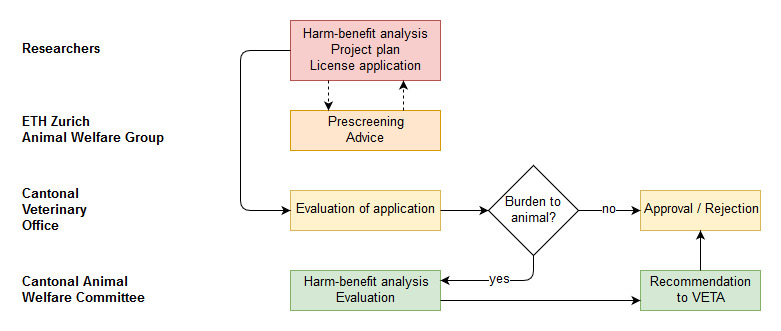Rules for researchers

Animal experimentation is regulated by strict laws. This page provides an overview for researchers at ETH Zurich. Further information can be found on the websites of the responsible authorities (external page Canton, external page Bund). At ETH Zurich animal welfare officers offer additional advice to all affiliated researchers.
All scientific activities involving living animals classify as animal experimentation under the Animal Welfare Act (external page Tierschutzgesetz) and are subject to the rules described on this page.
The definition of "animal experimentation" is rather wide and covers diverse situations:
- You may be doing research or teaching.
- You may be using animals as a means to a scientific end (usually research in humans) or be interested in the animals themselves.
- You may be taking samples from living or dead animals.
The ETH Zurich members of Research Ethics & Animal Welfare group can advice you on whether your activities are subject to animal welfare regulations or not.
If you want to conduct scientific work with animals in Switzerland, you have to comply to the following requirements:
- Depending on your role in a project, you need to complete basic training and regular advanced training courses.
- Each study involving animal experiments as well as changes to running studies must be external page approved by the Cantonal Veterinary Office.
- Animals must be kept in a way that is appropriate to the species. Their housing must be approved by the Cantonal Veterinary Office too.
- During experiments, you must document the monitoring of the animals as well as implementation of study end point criteria and, comply with study-specific additional requirements of the Cantonal Veterinary Office.
- Reports to the Cantonal Veterinary Office must be submitted at the end of each study as well as annually in case you are conducting a study or keeping animals.
It is in your responsibility as a researcher to file an application in which you describe your project and conduct a harm-benefit analysis. ETH Zurich's animal welfare officers give you advice, prereview your proposal and forward it to the external page Cantonal Veterinary Office which rejects or approves the experimentation. For studies that involve burden to the animals, the Cantonal Veterinary Office consults the Cantonal Committee for Animal Experiments.

Please find all necessary documents on the page external page Versuchstiere & Tierversuche of the Cantonal Veterinary Office. Do not hesitate to contact animal welfare officers when you are planning to file an application.
License applications may be submitted to the Cantonal Veterinary Office at any time. If the planned study is categorized as involving external page burden to the animals, the Cantonal Committee for Animal Experiments will be involved.
The evaluation of a burdening animal experiment typically takes four to five months. However, for complex applications, the duration may be longer.
Approvals are valid for a maximum of three years.
If you need to perform or direct animal experiments, you first need to complete trainng courses recognized by the Cantonal Veterinary Office. These are organised locally in by the external page Institute for Laboratory Animal Science (LTK) of UZH and Safety, Security, Health, Environment Division (SSHE) ETH:
Introductory courses are often fully booked early, so please register in time. As an alternative to an LTK course, you ask the Animal Welfare Group about equivalence of courses accredited by the European Laboratory Animal Associations (external page FELASA) abroad. A 1-day follow-up training in Switzerland is mandatory in this case.
For study directors, the following additional requirements apply:
- An academic degree including basic knowledge in anatomy, physiology, zoology and ethology, genetics and molecular biology, hygiene, and biostatistics
- Three years of practical experience in animal experimentation
- For experiments with less commonly used species or other than standard methods: proof of required specialist knowledge
Independently of your role in experiments, you are required to participate in further education courses on a regular base:
- You need to complete four days of relevant training in a period of four years.
- These four days may be courses, conferences, or other relevant training events
- LTK in collaboration with ETH provides external page recognized training courses.
- If you wish to make use of a training event that is not pre-accredited, you need to external page apply recognition as relevant education from the Cantonal Veterinary Office. Animal welfare officers can assist you in this process.
Contact
ETH Zürich
Animal Welfare Office
Wolfgang-Pauli Strasse 27
8093
Zurich
Switzerland